20 Seldom Seen Photographs From History's Vault
Death2Dumpty
Published
11/25/2017
in
wow
Hard truths and interesting facts that must be seen to believe.
- List View
- Player View
- Grid View
Advertisement
-
1.
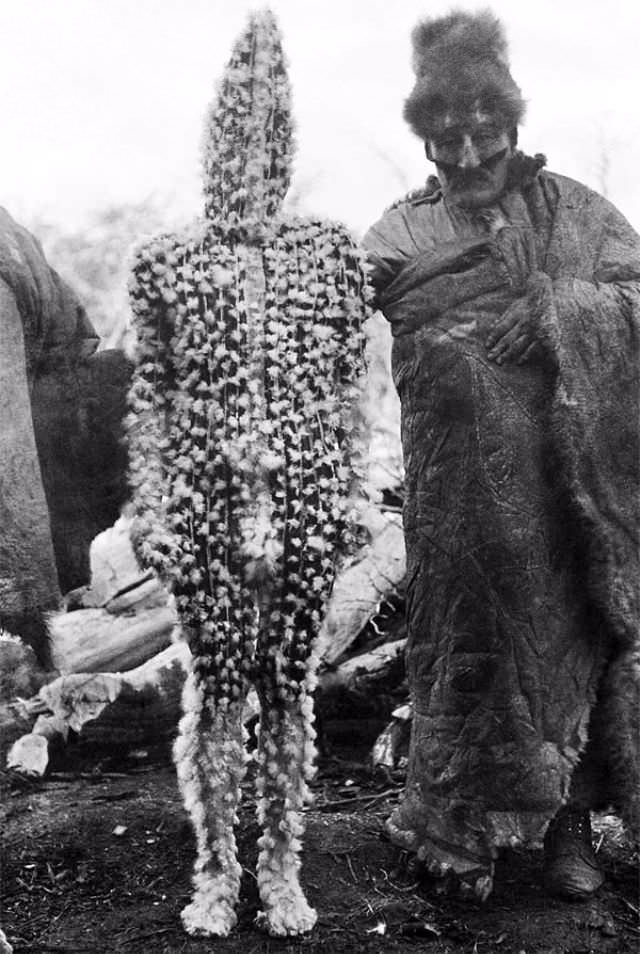 A native member of the Selk'nam, also known as the Onawo or Ona people, decorated for a Hain Ceremony on the Tierra del Fuego Islands off the Southern tip of South American in 1923. This tribe was one of the last in the America's to be exposed to colonists and settlers (outside of a few still yet to be integrated in the Amazon Rain Forest). The people once numbered near 4,000, but once they encountered European settlers in the late 1800s, they experienced diseases, forced relocations, and forms of genocide. By 1930 around 100 were left, and the last known full blooded Selk'nam died in 1974. Chile in particular moved them right into concentration camps in the early 1900s, killing hundreds. Cattle breeders, farmers and gold-prospectors from Argentina, Chile, the UK and the USA had entered the region, and got many of the native leaders drunk, literally. They then took over the tribes, deported and exterminated them, with bounties paid to the most ruthless hunters, including women and children. A people that had been in that same region for thousands of years now no longer exists. Many really cool photos of tribesmen in full ceremonial body paint exist, however they were usually nude, but I recommend you look them up.
A native member of the Selk'nam, also known as the Onawo or Ona people, decorated for a Hain Ceremony on the Tierra del Fuego Islands off the Southern tip of South American in 1923. This tribe was one of the last in the America's to be exposed to colonists and settlers (outside of a few still yet to be integrated in the Amazon Rain Forest). The people once numbered near 4,000, but once they encountered European settlers in the late 1800s, they experienced diseases, forced relocations, and forms of genocide. By 1930 around 100 were left, and the last known full blooded Selk'nam died in 1974. Chile in particular moved them right into concentration camps in the early 1900s, killing hundreds. Cattle breeders, farmers and gold-prospectors from Argentina, Chile, the UK and the USA had entered the region, and got many of the native leaders drunk, literally. They then took over the tribes, deported and exterminated them, with bounties paid to the most ruthless hunters, including women and children. A people that had been in that same region for thousands of years now no longer exists. Many really cool photos of tribesmen in full ceremonial body paint exist, however they were usually nude, but I recommend you look them up. -
2.
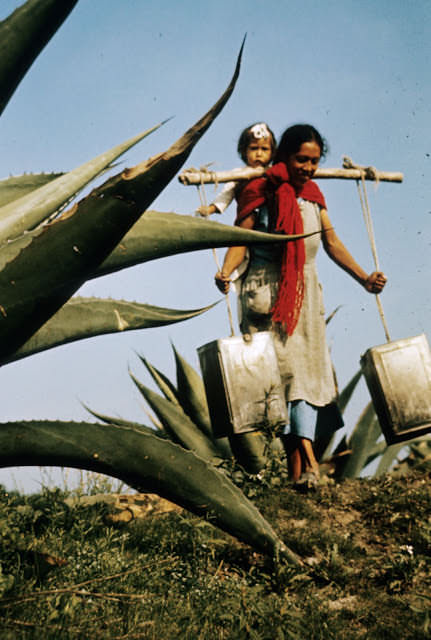 A woman carries supplies to make bread on her husbands farm somewhere in Mexico in the 1950s. The furnace is located in its own area, and as you can see, the woman is literally carrying her child on her back wrapped to her by only a thick scarf. This same family had no modern appliances, washed their clothes in a local stream, but would send their kids to school and trade in local towns. This is a common site in Mexico in some parts even to this day.
A woman carries supplies to make bread on her husbands farm somewhere in Mexico in the 1950s. The furnace is located in its own area, and as you can see, the woman is literally carrying her child on her back wrapped to her by only a thick scarf. This same family had no modern appliances, washed their clothes in a local stream, but would send their kids to school and trade in local towns. This is a common site in Mexico in some parts even to this day. -
3.
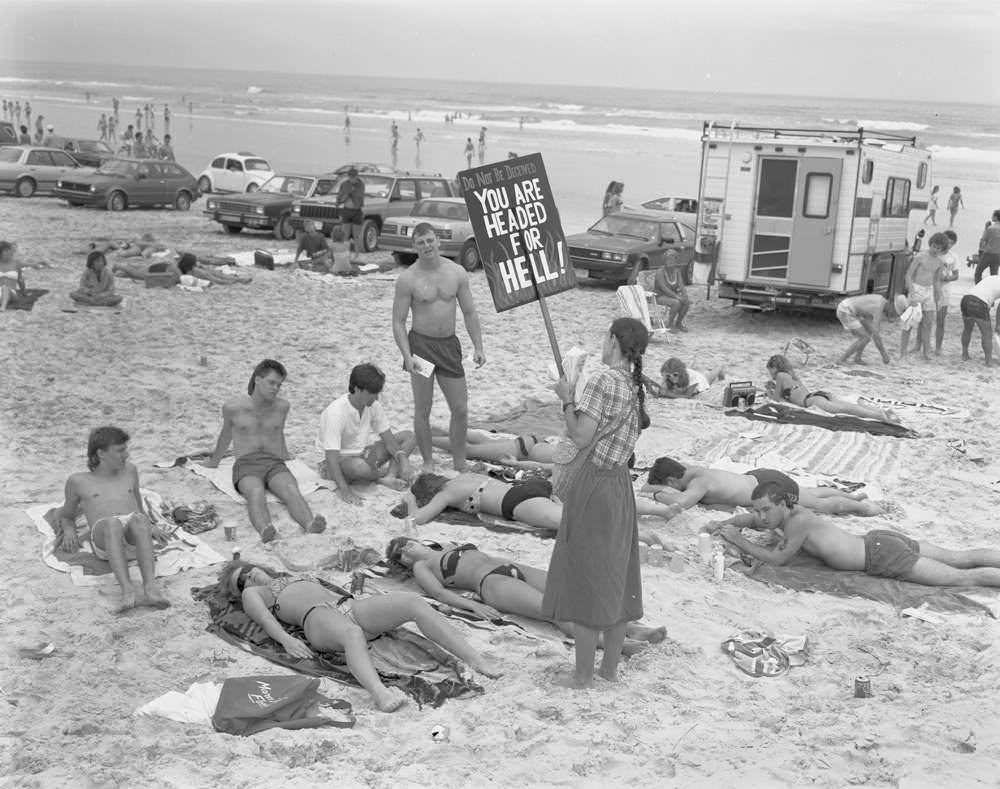 A religious woman carries a sign and confronts young men and women on spring break in Miami, FL, US in 1987. The notion of spring break was becoming synonymous with sex, drugs, alcohol, and nonstop partying, leading certain people and groups to protest against it. Some congressman even weighed in on it, sort of condemning it without proposing legislation to control it. To this day, spring break is a popular week for college kids to get away and party, usually at beaches all over Florida, California, parts of Mexico, and numerous other places. For those that will ask, this is a picture used in a magazine, hence why its in black and white. It was far cheaper to use black and white in those days and still have excellent quality. Black and white magazine photos were common right up until the internet took off in the mid to late 1990s.
A religious woman carries a sign and confronts young men and women on spring break in Miami, FL, US in 1987. The notion of spring break was becoming synonymous with sex, drugs, alcohol, and nonstop partying, leading certain people and groups to protest against it. Some congressman even weighed in on it, sort of condemning it without proposing legislation to control it. To this day, spring break is a popular week for college kids to get away and party, usually at beaches all over Florida, California, parts of Mexico, and numerous other places. For those that will ask, this is a picture used in a magazine, hence why its in black and white. It was far cheaper to use black and white in those days and still have excellent quality. Black and white magazine photos were common right up until the internet took off in the mid to late 1990s. -
4.
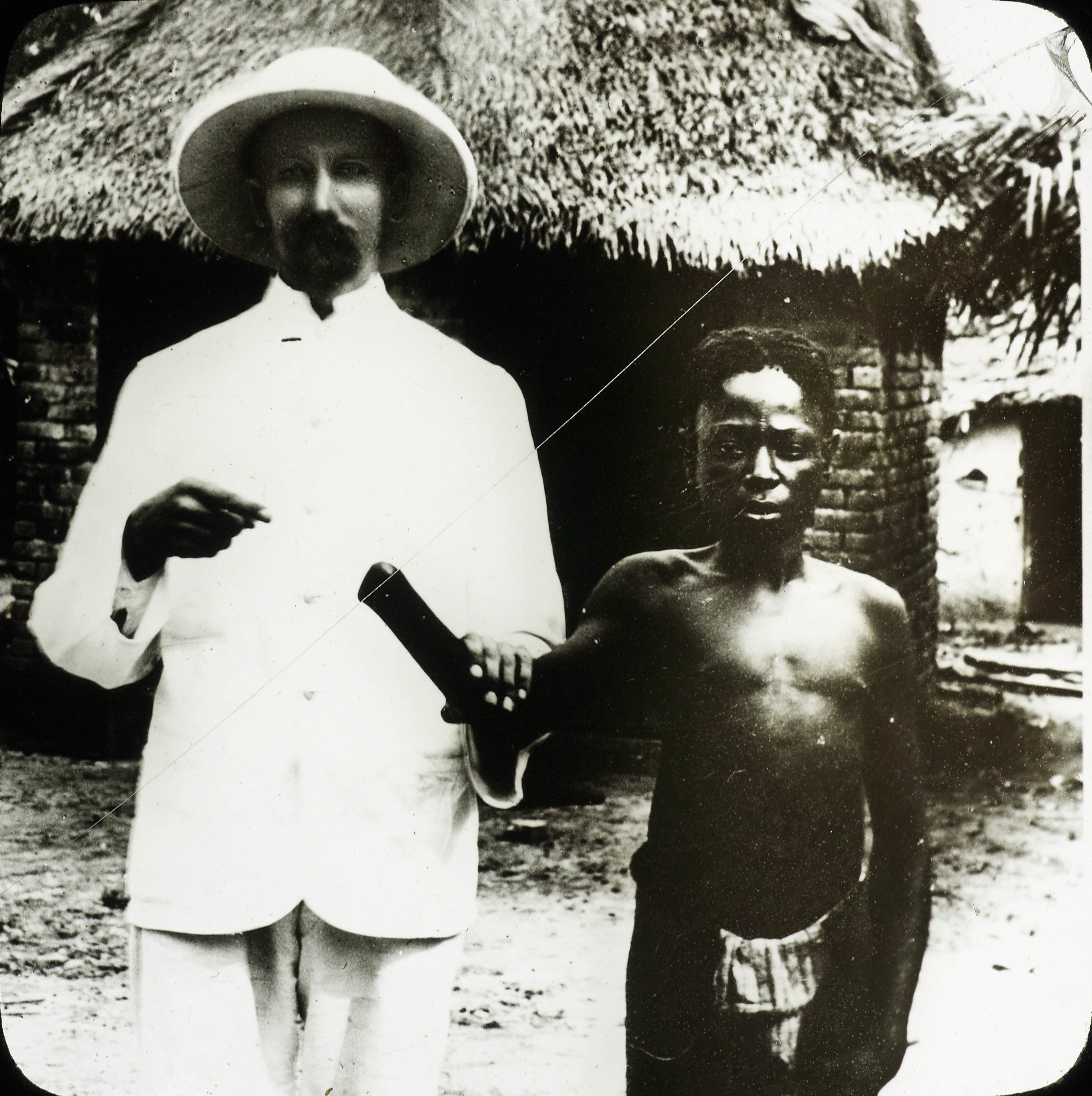 A European missionary shows a young boy with his hand cut off in Belgian Congo in 1903. The territory was privately owned by King Leopold II of Belgium, and the native people were used in forced labor to pay off the Kings debts. If they did not meet their quota, hired mercenaries would routinely chop off the limbs of the workers children, so the workers could still work. The workers were basically slaves, suffering from horrible atrocities Leopold's private army would do at will. The territory was called the Congo Free State, and was anything but. When it finally came out what was going on after almost 25 years, Leopold II gave up control, and things finally changed. However, this was one of the last areas that instituted forms of slavery on a country wide scale, nearly 50 years after the US eliminated it. It also employed forms of genocide, and its possible up to 20 million people died during the 25 or so years it went on. Exact figures are unknown, but it was bad, really bad.
A European missionary shows a young boy with his hand cut off in Belgian Congo in 1903. The territory was privately owned by King Leopold II of Belgium, and the native people were used in forced labor to pay off the Kings debts. If they did not meet their quota, hired mercenaries would routinely chop off the limbs of the workers children, so the workers could still work. The workers were basically slaves, suffering from horrible atrocities Leopold's private army would do at will. The territory was called the Congo Free State, and was anything but. When it finally came out what was going on after almost 25 years, Leopold II gave up control, and things finally changed. However, this was one of the last areas that instituted forms of slavery on a country wide scale, nearly 50 years after the US eliminated it. It also employed forms of genocide, and its possible up to 20 million people died during the 25 or so years it went on. Exact figures are unknown, but it was bad, really bad. -
5.
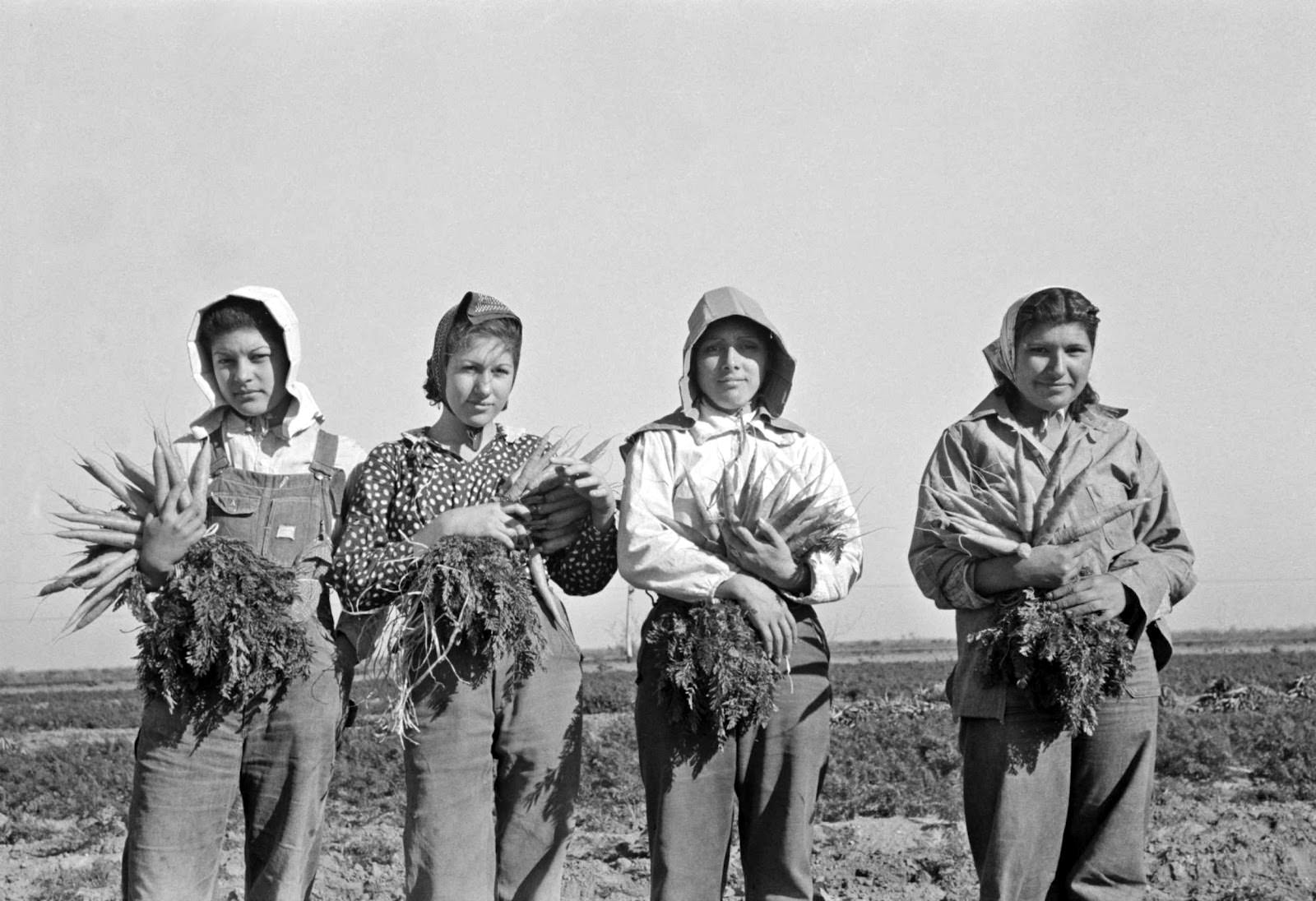 Mexican girls hired to pick fields in Texas, US in 1939. The labor would be cheaper, and Southern US farmers would sometimes pay to have them transported to the US to work. Some assume Mexicans have always just hopped illegally across the border looking for work, but long ago, they were paid to come over to work by rich farmers. Such a practice was a form of indentured servitude, and was common. Entire farms in the area during this time would be worked by Mexicans, and for poor wages, making rich farmers richer. This would all change of course with new laws, corporations taking over agriculture, and other major factors that shaped modern farming in the US today.
Mexican girls hired to pick fields in Texas, US in 1939. The labor would be cheaper, and Southern US farmers would sometimes pay to have them transported to the US to work. Some assume Mexicans have always just hopped illegally across the border looking for work, but long ago, they were paid to come over to work by rich farmers. Such a practice was a form of indentured servitude, and was common. Entire farms in the area during this time would be worked by Mexicans, and for poor wages, making rich farmers richer. This would all change of course with new laws, corporations taking over agriculture, and other major factors that shaped modern farming in the US today. -
6.
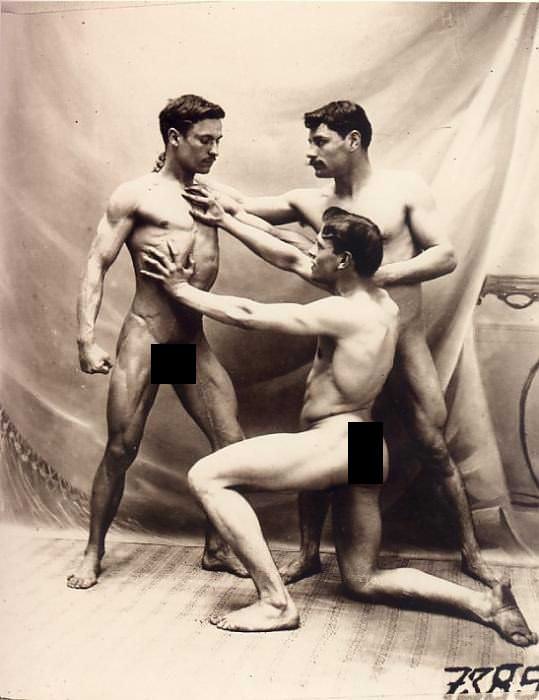 3 Male models pose nude for a French magazine in 1900. The sexual nature of France allowed such pictures to not only be accepted, but thrive. Magazines did up to 75 pictures in one edition of just men naked. One such example was La Beaute Magazine. It would be labelled as fine art and distributed all over the country, sometimes outside of it. The purchaser of these magazines was believed to be mostly gay men, and rarely women, even in France. Forgive the blacked out lines, but I did not want this flagged as mature.
3 Male models pose nude for a French magazine in 1900. The sexual nature of France allowed such pictures to not only be accepted, but thrive. Magazines did up to 75 pictures in one edition of just men naked. One such example was La Beaute Magazine. It would be labelled as fine art and distributed all over the country, sometimes outside of it. The purchaser of these magazines was believed to be mostly gay men, and rarely women, even in France. Forgive the blacked out lines, but I did not want this flagged as mature. -
7.
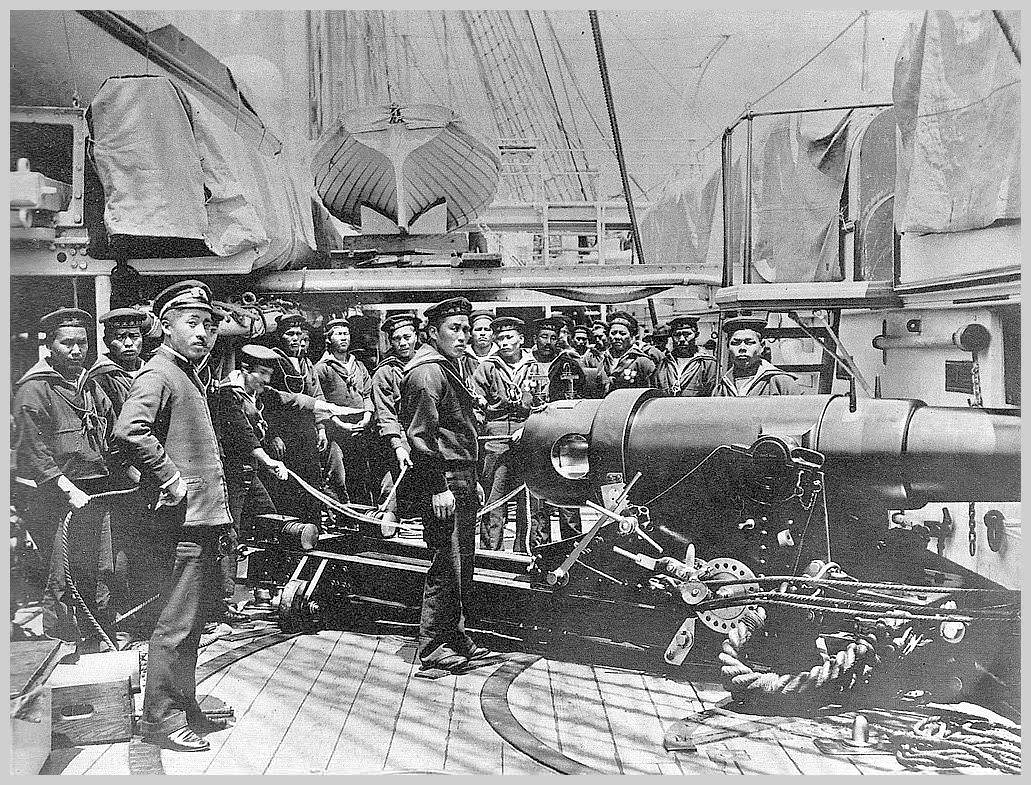 Japanese sailors on a battleship during the Russo-Japanese War in 1904. The war was quick, lasting a year and a half. The Japanese defeated the Russians, destroying their Pacific fleet, and gaining territory. The Japanese Navy in particular performed very well and used strong tactics to destroy the Russian fleet. The Japanese victory gave them confidence after defeating a world power, and many consider this the key victory that ignited Japanese expansionism and aggression. Their land tactics of hard full frontal assaults worked, despite many casualties, and were used to great success later in WWII especially in China, when the would win battles despite being outnumbered sometimes 6 to 1. Many European powers watched this war closely, even sending advisors, as to see modern tactics and weapons used in large scale battles for one of the first times in the 20th century.
Japanese sailors on a battleship during the Russo-Japanese War in 1904. The war was quick, lasting a year and a half. The Japanese defeated the Russians, destroying their Pacific fleet, and gaining territory. The Japanese Navy in particular performed very well and used strong tactics to destroy the Russian fleet. The Japanese victory gave them confidence after defeating a world power, and many consider this the key victory that ignited Japanese expansionism and aggression. Their land tactics of hard full frontal assaults worked, despite many casualties, and were used to great success later in WWII especially in China, when the would win battles despite being outnumbered sometimes 6 to 1. Many European powers watched this war closely, even sending advisors, as to see modern tactics and weapons used in large scale battles for one of the first times in the 20th century. -
8.
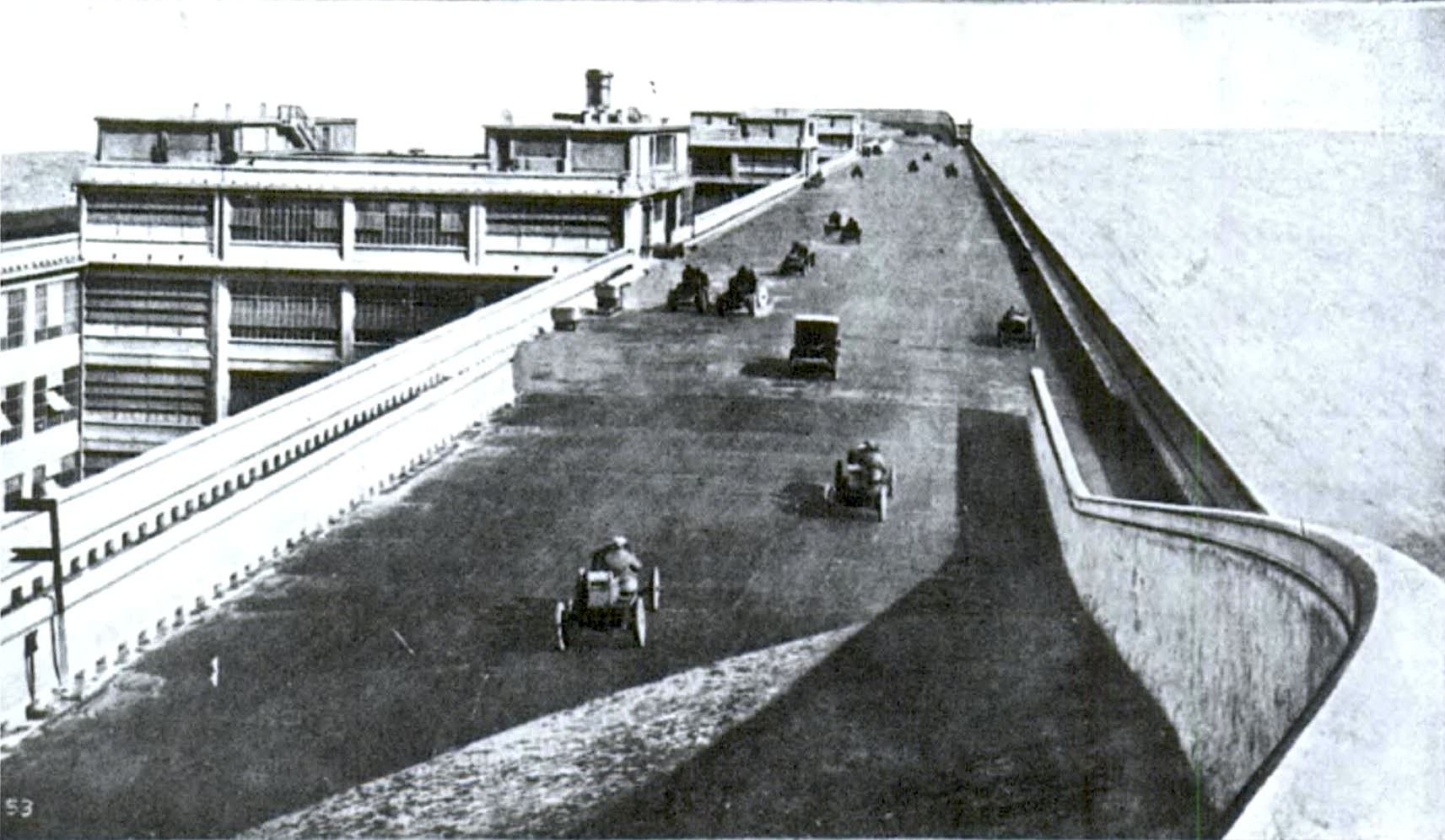 The roof of the Lingotto Building which housed the Fiat Automotive Company in Turin, Italy in 1924. Opened the year before, the factory was unique as they would test the cars right on the roof. All sorts of tests were possible and it was in use to some capacity until the 1970s, and then the building shut down completely in 1982.
The roof of the Lingotto Building which housed the Fiat Automotive Company in Turin, Italy in 1924. Opened the year before, the factory was unique as they would test the cars right on the roof. All sorts of tests were possible and it was in use to some capacity until the 1970s, and then the building shut down completely in 1982. -
9.
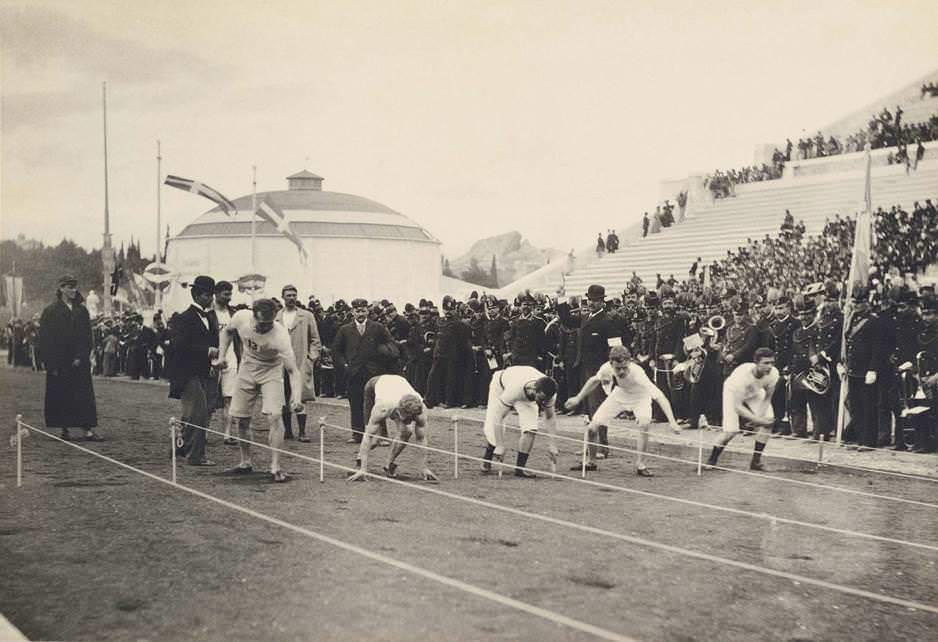 Runners prepare to run the 100m dash at the first modern Olympic Games in Athens, Greece in 1896. American Thomas Burke (second from left) would win gold finishing first at around 12 seconds. Only 14 nations participated; Australia, Austria, Bulgaria, Chile, Denmark, France, Germany, Great Britain, Greece, Hungary, Italy, Sweden, Switzerland and the US. The US took the most golds, at 11, while the home country Greece took the most medals at 46. Most athletes paid for everything themselves, as Olympic programs didn't exist. 241 total athletes competed in a total of 43 events over 9 days.
Runners prepare to run the 100m dash at the first modern Olympic Games in Athens, Greece in 1896. American Thomas Burke (second from left) would win gold finishing first at around 12 seconds. Only 14 nations participated; Australia, Austria, Bulgaria, Chile, Denmark, France, Germany, Great Britain, Greece, Hungary, Italy, Sweden, Switzerland and the US. The US took the most golds, at 11, while the home country Greece took the most medals at 46. Most athletes paid for everything themselves, as Olympic programs didn't exist. 241 total athletes competed in a total of 43 events over 9 days. -
10.
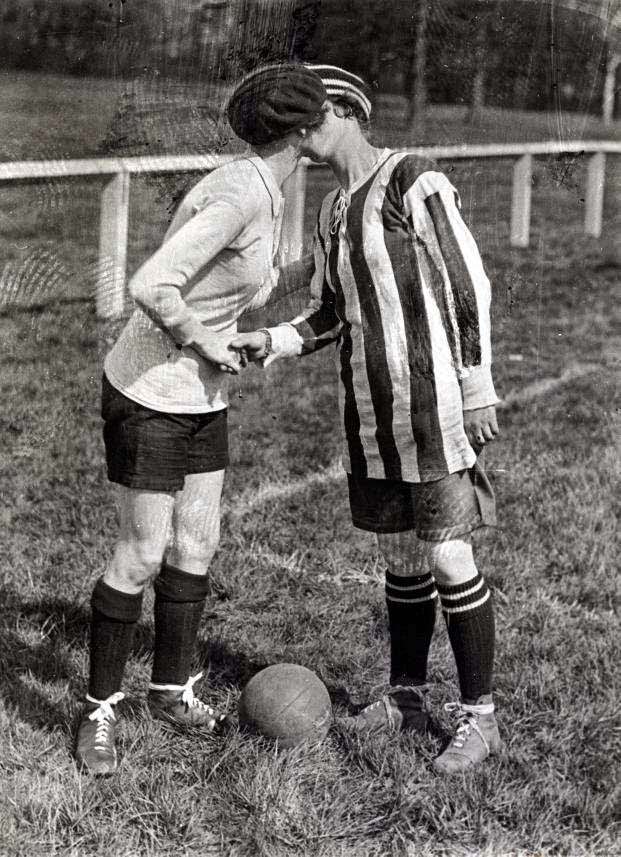 A friendly kiss between members of a womens British and French football (soccer) clubs in Preston, England in 1920. Men's football was already growing rapidly, and had a huge international draw, but England and France embraced women's football from basiclaly the beginning as well. However it had trouble marketing it, and sadly, this kind of image was a way to promote future matches. Regardless, both England and France had clubs throughout the sports history, and other European countries did so as well or would follow soon after. Eventually, like the Men, it caught on international and is still growing to this day.
A friendly kiss between members of a womens British and French football (soccer) clubs in Preston, England in 1920. Men's football was already growing rapidly, and had a huge international draw, but England and France embraced women's football from basiclaly the beginning as well. However it had trouble marketing it, and sadly, this kind of image was a way to promote future matches. Regardless, both England and France had clubs throughout the sports history, and other European countries did so as well or would follow soon after. Eventually, like the Men, it caught on international and is still growing to this day. -
11.
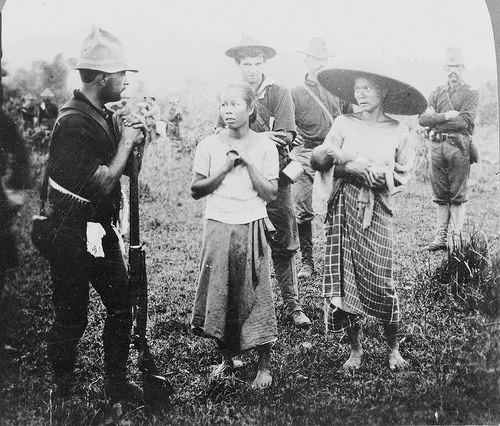 2 Terrified women are taken in for questioning South of Manila at the beginning of the Philippine-American War in 1899. After the US bought the Philippines from Spain for $20 million after defeating Spain in the Spanish-American War as part of their post war treaty, the local Filipinos immediately revolted, refusing yet another colonial rule. The US with now a firm territory in the Pacific never considered allowing the local population independence. The 3 year war was horrific. The US soldiers considered Filipinos nothing higher than a dog, and during operations, would routinely slaughter them. Men, women, children, it did not matter. During the war alone, around 20,000 Filipino soldiers died in the fighting, but the soldiers killed around 34,000 unarmed civilians as well. Another 200,000 civilians died due to an outbreak of Cholera, which the US did virtually nothing to contain or treat outside their own soldiers. The US lost around 6,000 killed as well. The atrocities were so bad that at least 6 known soldiers in 1900 alone defected to the Filipinos side. Those soldiers were Privates John Wagner, Edward Walpole, Harry Dennis and John Allance, a Private Meeks and Private William Hyer whom all became vital in organizing civilian resistance. Sadly, the war may have ended in 1902, but the killing continued through Guerilla warfare in the Moro Rebellion that lasted until 1913. Figures of Filipino dead from that conflict were also extremely high, but I could not find a good source with exact figures.
2 Terrified women are taken in for questioning South of Manila at the beginning of the Philippine-American War in 1899. After the US bought the Philippines from Spain for $20 million after defeating Spain in the Spanish-American War as part of their post war treaty, the local Filipinos immediately revolted, refusing yet another colonial rule. The US with now a firm territory in the Pacific never considered allowing the local population independence. The 3 year war was horrific. The US soldiers considered Filipinos nothing higher than a dog, and during operations, would routinely slaughter them. Men, women, children, it did not matter. During the war alone, around 20,000 Filipino soldiers died in the fighting, but the soldiers killed around 34,000 unarmed civilians as well. Another 200,000 civilians died due to an outbreak of Cholera, which the US did virtually nothing to contain or treat outside their own soldiers. The US lost around 6,000 killed as well. The atrocities were so bad that at least 6 known soldiers in 1900 alone defected to the Filipinos side. Those soldiers were Privates John Wagner, Edward Walpole, Harry Dennis and John Allance, a Private Meeks and Private William Hyer whom all became vital in organizing civilian resistance. Sadly, the war may have ended in 1902, but the killing continued through Guerilla warfare in the Moro Rebellion that lasted until 1913. Figures of Filipino dead from that conflict were also extremely high, but I could not find a good source with exact figures. -
12.
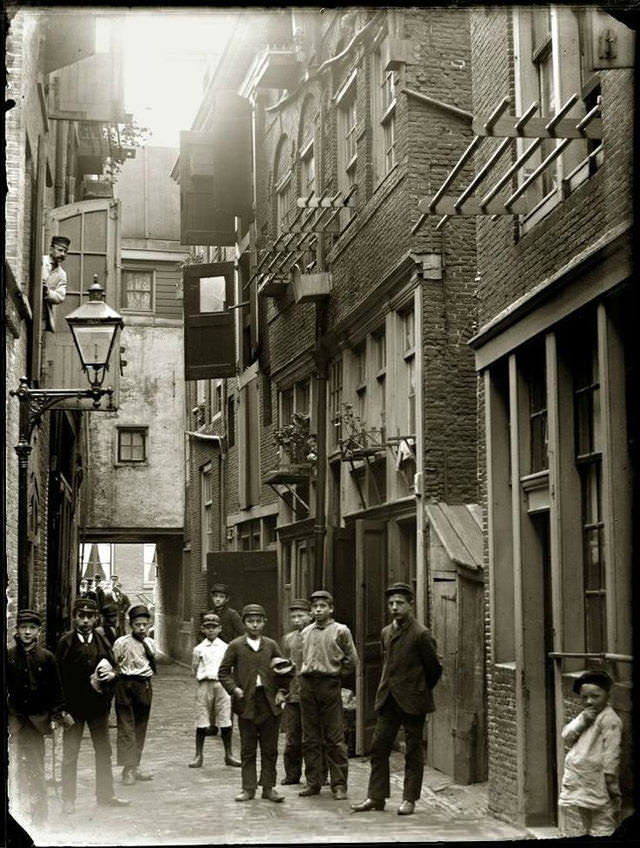 Children pose for a picture on Gebed Zonder End in Amsterdam, The Netherlands in 1892. Every single child in this picture has a job, and the photographer wanted to capture that. Child labor is nothing knew, and was common across the globe as a cheap and easy way to fill out factories. This is well before the child labor laws that exist now in most countries and well before unions which helped to fix the horrible working conditions of the factories.
Children pose for a picture on Gebed Zonder End in Amsterdam, The Netherlands in 1892. Every single child in this picture has a job, and the photographer wanted to capture that. Child labor is nothing knew, and was common across the globe as a cheap and easy way to fill out factories. This is well before the child labor laws that exist now in most countries and well before unions which helped to fix the horrible working conditions of the factories. -
13.
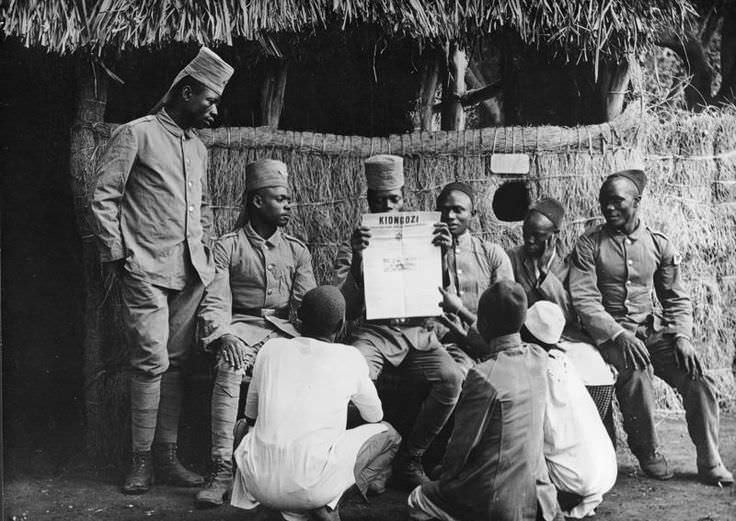 Local soldiers in German East Africa (modern day Rwanda) gather to read a newspaper with an update of the outbreak of WWI. Most of the war took place in Europe of course, but some operations took place in Africa. Outnumbered and rarely resupplied, German colonies fought a guerilla war to try and bog down mainly British troops in Africa. As with British territories in Africa as well, the locals within the colonies were often conscripted and fought. Northern African colonies would even fight in Europe, but soldiers such as these fought locally. Some of the German regiments even remained at large right up until the end of the war, unable to be destroyed or captured by the larger and better equipped British units after them.
Local soldiers in German East Africa (modern day Rwanda) gather to read a newspaper with an update of the outbreak of WWI. Most of the war took place in Europe of course, but some operations took place in Africa. Outnumbered and rarely resupplied, German colonies fought a guerilla war to try and bog down mainly British troops in Africa. As with British territories in Africa as well, the locals within the colonies were often conscripted and fought. Northern African colonies would even fight in Europe, but soldiers such as these fought locally. Some of the German regiments even remained at large right up until the end of the war, unable to be destroyed or captured by the larger and better equipped British units after them. -
14.
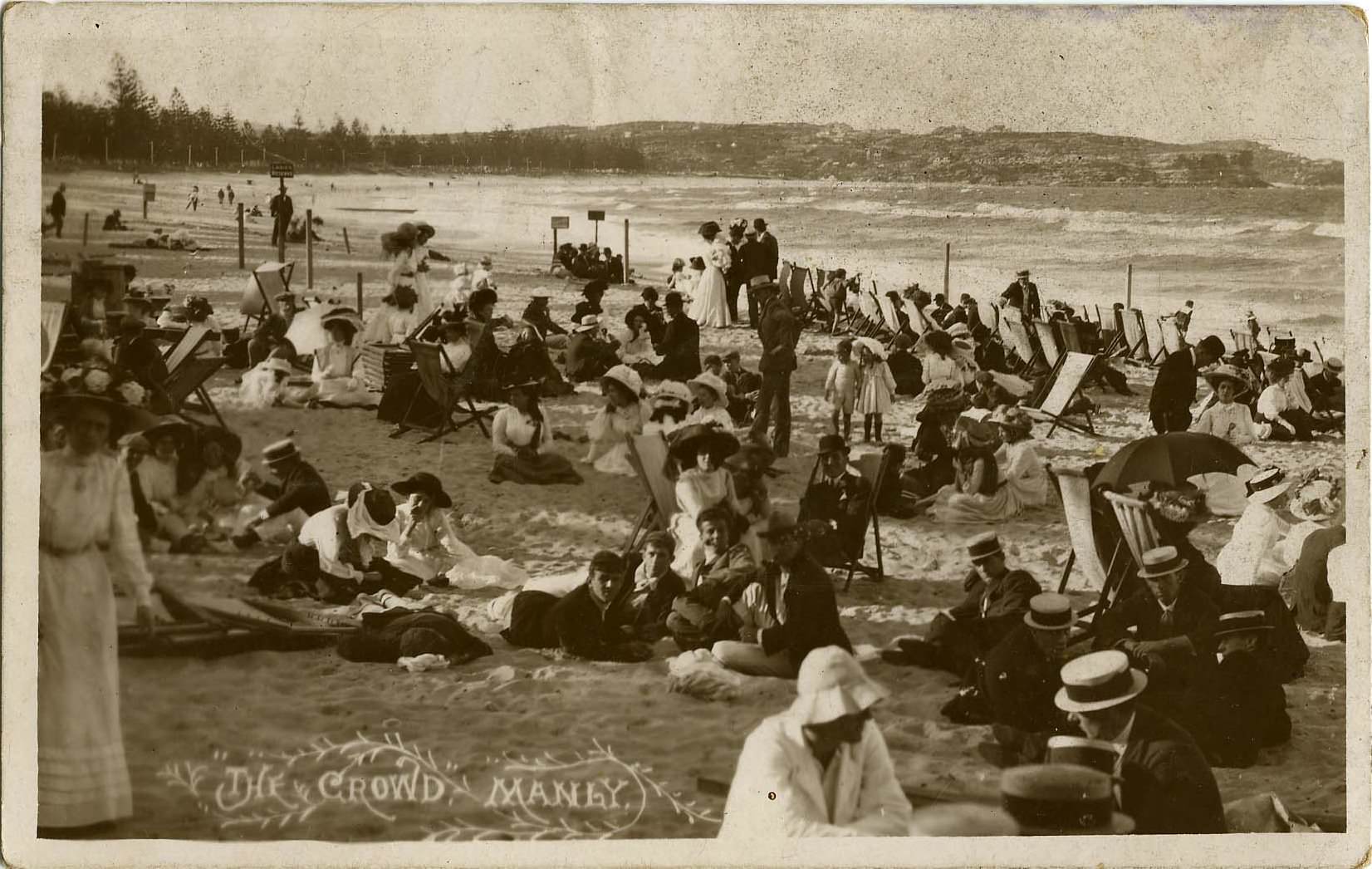 People enjoy a day at the beach in Manly, Australia in 1890. I don't know why it appears no one is in the water, but as you can see, everyone is very overly dressed for what most of us would consider the beach. Not a single elbow, knee, shoulder, or back is showing on any of the beachgoers. The ones sitting in the sand don't even have anything underneath them, getting sand all in their proper clothing. This image was used for a postcard to advertise Manly. If anyone was swimming, it would be in full body suits, also barely showing limbs and not much skin outside of hands, feet, and the head, as was common for the time period.
People enjoy a day at the beach in Manly, Australia in 1890. I don't know why it appears no one is in the water, but as you can see, everyone is very overly dressed for what most of us would consider the beach. Not a single elbow, knee, shoulder, or back is showing on any of the beachgoers. The ones sitting in the sand don't even have anything underneath them, getting sand all in their proper clothing. This image was used for a postcard to advertise Manly. If anyone was swimming, it would be in full body suits, also barely showing limbs and not much skin outside of hands, feet, and the head, as was common for the time period. -
15.
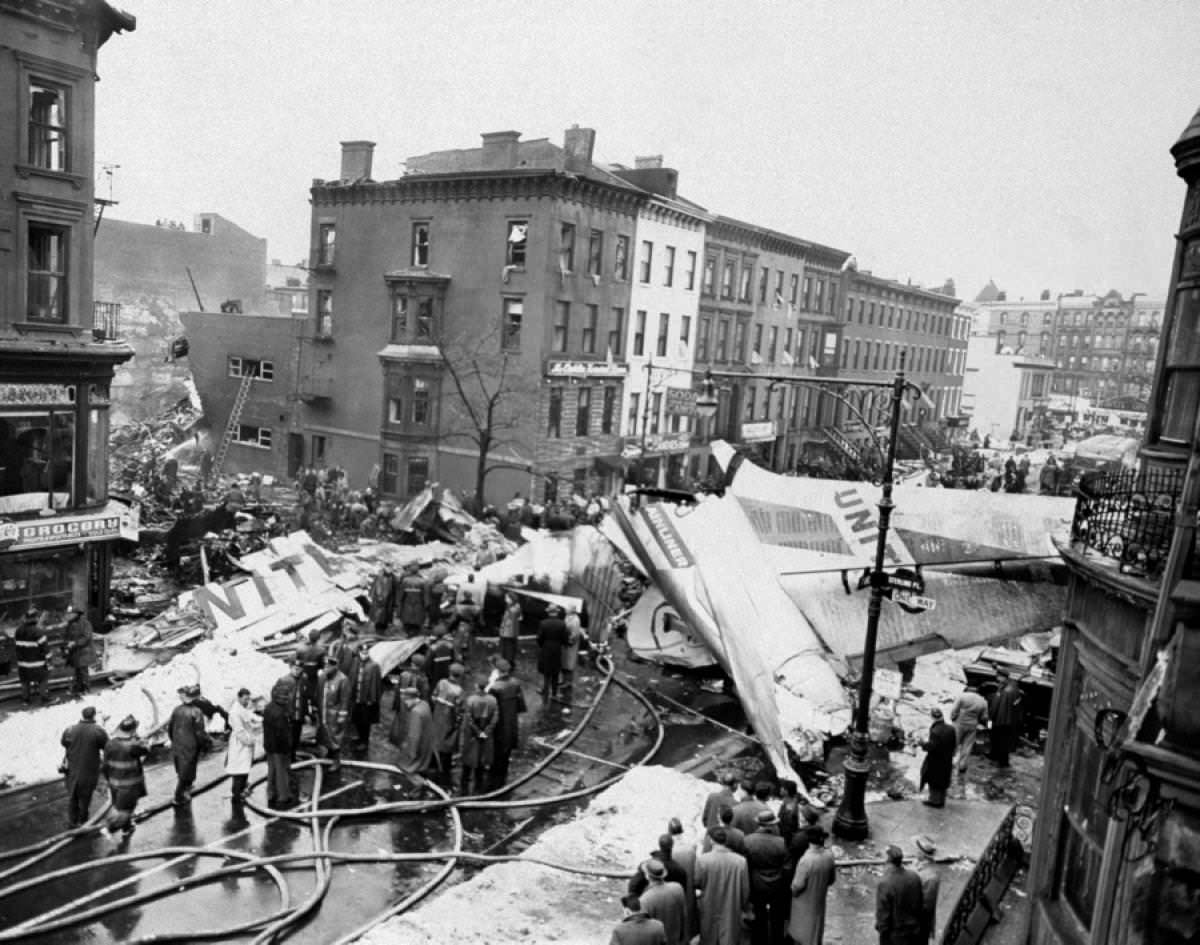 Workers work on finding survivors or the remains of the dead after a plane crashed in Brooklyn, NYC, US in 1960. This crash was known as the Park Slope Plane Crash. 2 Planes collided, both crashed in NYC, one here and the other on Stanton Island. All 128 people total on the 2 planes died, as well as 6 people on the ground. The crash was the worst in the US until 1968.
Workers work on finding survivors or the remains of the dead after a plane crashed in Brooklyn, NYC, US in 1960. This crash was known as the Park Slope Plane Crash. 2 Planes collided, both crashed in NYC, one here and the other on Stanton Island. All 128 people total on the 2 planes died, as well as 6 people on the ground. The crash was the worst in the US until 1968. -
16.
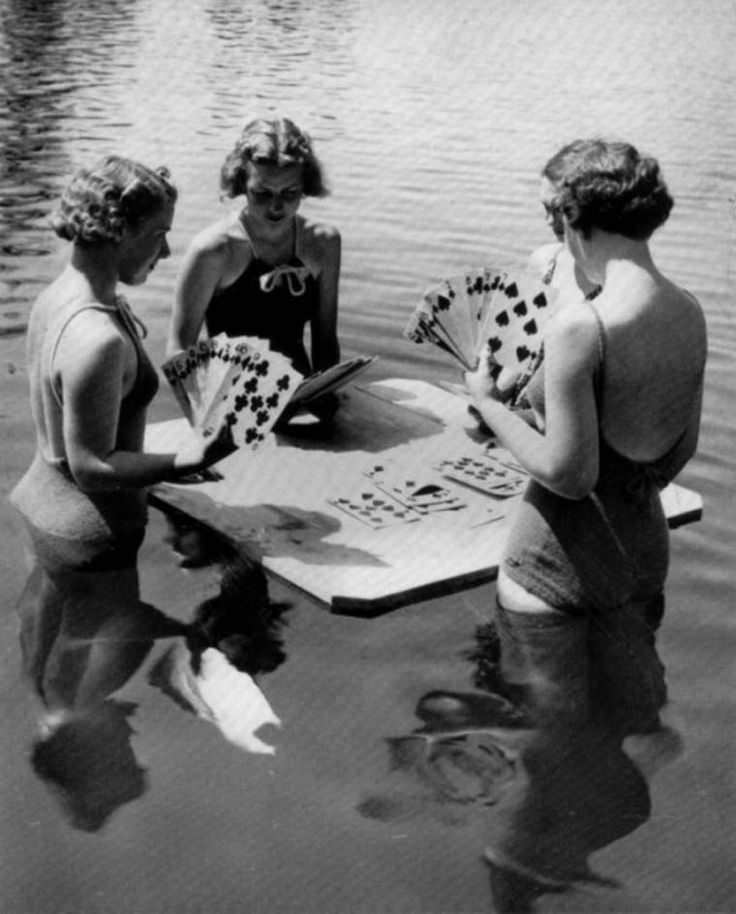 Women playing cards on a makeshift table at the beach somewhere in the US in 1922.
Women playing cards on a makeshift table at the beach somewhere in the US in 1922. -
17.
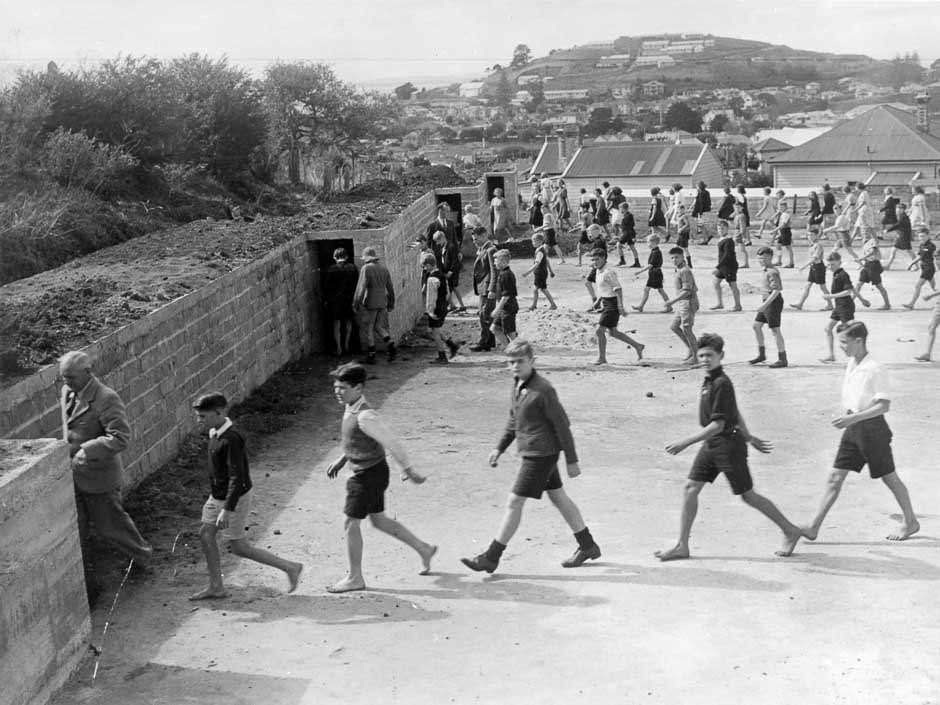 Students at Devonport Primary School in Auckland, New Zealand move to air raid shelters during a drill in 1941. As the Japanese advanced rapidly in the Pacific, they took over a huge area, and there were fears they would bomb and invade NZ. The Japanese did bomb Darwin in Australia, and were building an airfield on Guadalcanal to potential bomb both countries. The Kiwis were never bombed or invaded, as the Allies won the Battle of Guadalcanal and together put a halt to the Japanese advance. The Kiwis saw tons of action all over the world in support of Britain in particular. They were in Africa and Europe as well as the South Pacific. Of the 1.6 million people in NZ at the time, around 160,000 served, with 100,000 seeing involvement around the world, and 30,000 casualties. Their Air Force in particular was heavily involved in some major battles.
Students at Devonport Primary School in Auckland, New Zealand move to air raid shelters during a drill in 1941. As the Japanese advanced rapidly in the Pacific, they took over a huge area, and there were fears they would bomb and invade NZ. The Japanese did bomb Darwin in Australia, and were building an airfield on Guadalcanal to potential bomb both countries. The Kiwis were never bombed or invaded, as the Allies won the Battle of Guadalcanal and together put a halt to the Japanese advance. The Kiwis saw tons of action all over the world in support of Britain in particular. They were in Africa and Europe as well as the South Pacific. Of the 1.6 million people in NZ at the time, around 160,000 served, with 100,000 seeing involvement around the world, and 30,000 casualties. Their Air Force in particular was heavily involved in some major battles. -
18.
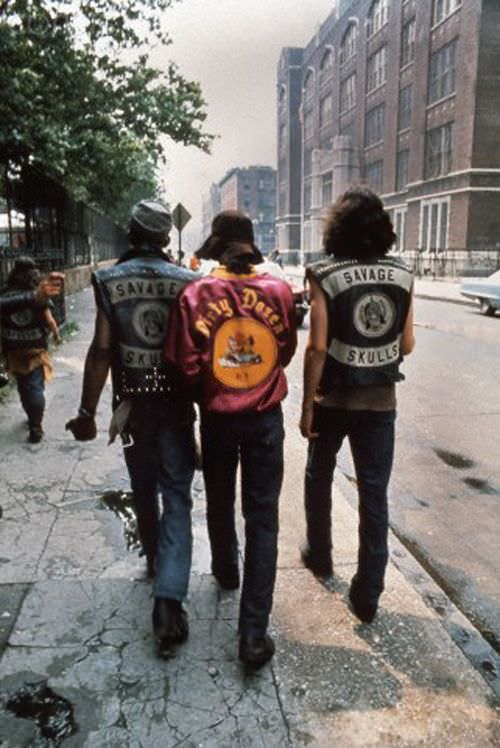 3 Gang members walk the streets of New York City, US in 1972. Gangs were a part of NYC since pretty much the beginning, as groups would fight for control of streets and certain trades. The 1970s brought gangs into colorful ensembles that were easy to spot, making their presence felt. The film The Warriors is a great example of this as they used real gangs for security and costume design for the ones features in the film.
3 Gang members walk the streets of New York City, US in 1972. Gangs were a part of NYC since pretty much the beginning, as groups would fight for control of streets and certain trades. The 1970s brought gangs into colorful ensembles that were easy to spot, making their presence felt. The film The Warriors is a great example of this as they used real gangs for security and costume design for the ones features in the film. -
19.
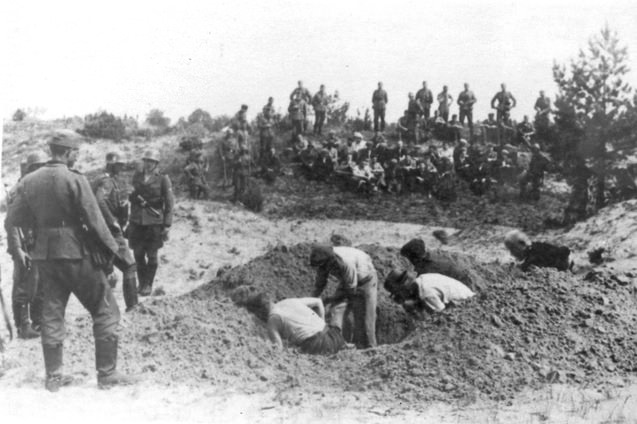 Jewish men dig their own graves in occupied territory in Belarus in 1941. You can see the other Jews sitting waiting for the hole to be finished and for them all to be executed. Rather than deport them or use them for work camps, and with only around a few hundred to manage as well as how eager to kill as many as they could, the SS organized details to round up Jews in newly occupied towns and cities, have the Jews themselves dig graves, and then execute them. In bigger areas with more Jews, they did round them up and put them in camps. But for smaller numbers and early in the War, this proved quick and easy, but had long lasting effects which I touch on in the next picture.
Jewish men dig their own graves in occupied territory in Belarus in 1941. You can see the other Jews sitting waiting for the hole to be finished and for them all to be executed. Rather than deport them or use them for work camps, and with only around a few hundred to manage as well as how eager to kill as many as they could, the SS organized details to round up Jews in newly occupied towns and cities, have the Jews themselves dig graves, and then execute them. In bigger areas with more Jews, they did round them up and put them in camps. But for smaller numbers and early in the War, this proved quick and easy, but had long lasting effects which I touch on in the next picture. -
20.
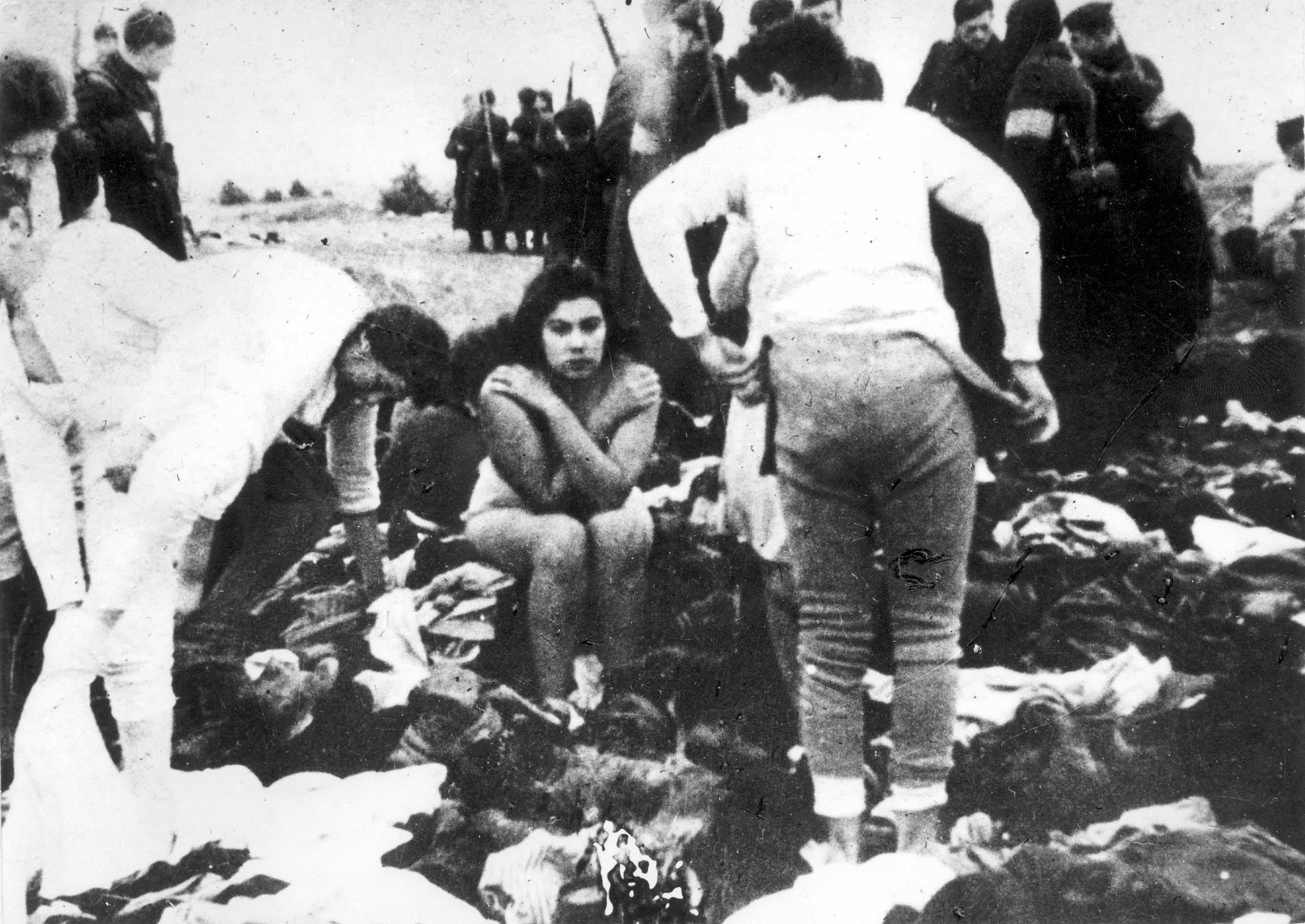 Continuing from the previous picture, a teenage girl sits frozen in fear as the other women around her strip their clothes off in Latvia in 1941. Moments later, the women would be led to a ditch nearby and shot. Everyone in this picture knew they were about to die. Nearly 3,000 Jews were killed in 3 days, almost all women and children. The SS orchestrated the executions rather than deportation. Throughout WWII, hundreds of thousands of Jews along with other undesirables such as gypsies, cripples, and special needs people were shot rather than gassed, especially early in the war as countries fell to the Third Reich. Part of the reason they would move to the Final Solution and have Jews and others gassed instead was not only because it was faster and far more efficient, but it was also less traumatic to their soldiers. Many soldiers, even SS divisions, proved they still had part of their humanity as they were having a lot of trouble shooting women and children.
Continuing from the previous picture, a teenage girl sits frozen in fear as the other women around her strip their clothes off in Latvia in 1941. Moments later, the women would be led to a ditch nearby and shot. Everyone in this picture knew they were about to die. Nearly 3,000 Jews were killed in 3 days, almost all women and children. The SS orchestrated the executions rather than deportation. Throughout WWII, hundreds of thousands of Jews along with other undesirables such as gypsies, cripples, and special needs people were shot rather than gassed, especially early in the war as countries fell to the Third Reich. Part of the reason they would move to the Final Solution and have Jews and others gassed instead was not only because it was faster and far more efficient, but it was also less traumatic to their soldiers. Many soldiers, even SS divisions, proved they still had part of their humanity as they were having a lot of trouble shooting women and children.
- NEXT GALLERY
-
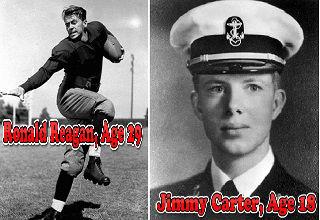
- 24 Photos of Past Presidents When They Were Younger
A native member of the Selk'nam, also known as the Onawo or Ona people, decorated for a Hain Ceremony on the Tierra del Fuego Islands off the Southern tip of South American in 1923. This tribe was one of the last in the America's to be exposed to colonists and settlers (outside of a few still yet to be integrated in the Amazon Rain Forest). The people once numbered near 4,000, but once they encountered European settlers in the late 1800s, they experienced diseases, forced relocations, and forms of genocide. By 1930 around 100 were left, and the last known full blooded Selk'nam died in 1974. Chile in particular moved them right into concentration camps in the early 1900s, killing hundreds. Cattle breeders, farmers and gold-prospectors from Argentina, Chile, the UK and the USA had entered the region, and got many of the native leaders drunk, literally. They then took over the tribes, deported and exterminated them, with bounties paid to the most ruthless hunters, including women and children. A people that had been in that same region for thousands of years now no longer exists. Many really cool photos of tribesmen in full ceremonial body paint exist, however they were usually nude, but I recommend you look them up.
20/20
1/20
Categories:
Wow


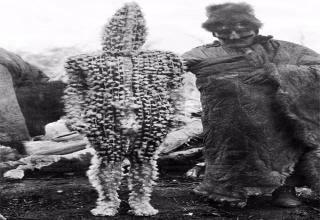
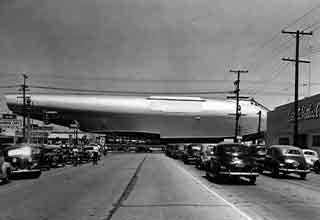




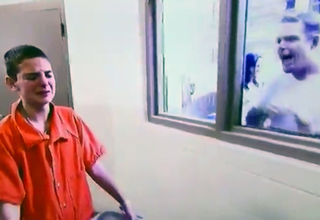
3 Comments